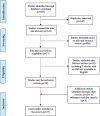Migration of adult children and mental health of older parents 'left behind': An integrative review
- PMID: 30346972
- PMCID: PMC6197646
- DOI: 10.1371/journal.pone.0205665
Migration of adult children and mental health of older parents 'left behind': An integrative review
Abstract
Background: Although a number of studies have examined the effect of the out-migration of children on the mental health of 'left behind' elderly parents, research on the consequences of children's migration on the mental health and well-being of elderly parents left behind is inconclusive and a systematic review is warranted.
Objectives: To identify the association between the left behind or empty nest status and the mental health of older parents, and to identify common risk factors for poor mental health among those left behind.
Methods: Online databases CINAHL, PsycINFO, PubMed, Scopus and ProQuest were searched for research (2000-September 2017) that focused on the relationship between the migration of adult children and the mental health of the older parents (≥50 years) left behind. The JBI Checklist for Analytical Cross Sectional Studies was used to assess the methodological quality of the articles.
Results: 25 articles met the inclusion criteria. The studies identified that left behind older parents had higher levels of mental health problems compared to non-left behind. Left behind parents had higher depressive symptoms, higher levels of loneliness, lower life satisfaction, lower cognitive ability and poorer psychological health. A number of risk factors were identified for mental health disorders among the left behind parents, which included living arrangements, gender, education, income, physical health status, physical activity, family and social support, age, rural residence and frequency of children's visit.
Conclusions: This review synthesised the various studies related to the mental health of left behind parents, advancing the theoretical and empirical understanding of the implications of out-migration of adult children on the psychological health and well-being of older parents. More responsive preventive measures and effective management approaches are required for this vulnerable cohort.
Conflict of interest statement
The authors have declared that no competing interests exist.
Figures
References
-
- IOM. World Migration Report 2018. International Organization for Migration, 2017. Available from: http://publications.iom.int/system/files/pdf/wmr_2018_en.pdf.
-
- Laczko F, Tjaden J, Auer D. Measuring Global Migration Potential, 2010–2015 In: (GMDAC) IsGMDAC, editor.: International Organization for Migration; 2017.
-
- Toyota M, Yeoh BSA, Nguyen L. Bringing the ‘left behind’ back into view in Asia: a framework for understanding the ‘migration–left behind nexus’. Population, Space and Place. 2007;13(3):157–61. 10.1002/psp.433 - DOI
-
- Asis MMB. Living with Migration. Asian Popul Stud. 2006;2(1):45–67. 10.1080/17441730600700556 - DOI
Publication types
MeSH terms
LinkOut - more resources
Full Text Sources
Medical
Miscellaneous


